Atlantic Monthly Contributors's Blog, page 296
November 16, 2015
The Paris Attacks: The Latest
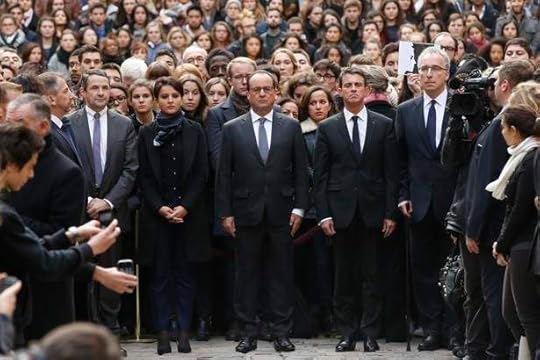
Updated on November 16 at 10:59 a.m. ET
What we know so far:
—President Obama called the Islamic State the “face of evil,” but ruled out sending ground troops into Syria as a response to the attack on Paris.
—An unnamed French official is telling the Associated Press that Friday’s deadly attacks in Paris were masterminded by Abdelhamid Abaaoud, a Belgian citizen believed to be in Syria. The official said Abaaoud was also behind the foiled attack on a French train in August.
—French prosecutors say one of the suicide bombers who carried out Friday’s attacks was Ahmed al-Mohammad, a Syrian passport holder who passed through the Greek island of Leros last month. Abaaoud was among two suicide bombers named Monday.
—French police carried out more than 150 raids in Bobigny, Lyon, and Toulouse, Prime Minister Manuel Valls said.
—French warplanes struck Islamic State targets in Raqqa, the Syrian city that the militant group claims as its capital.
—The death toll in Friday’s attack stands at 129. More than 350 others were injured.
French investigators carried out more than 150 raids across the country, days after multiple attacks across Paris killed at least 129 people and wounded more than 350 others.
An unnamed French official told the AP that Friday’s attack was masterminded by Abdelhamid Abaaoud, a Belgian citizen believed to be in Syria. The official said Abaaoud was also behind the foiled attack on a French train in August.
Related Story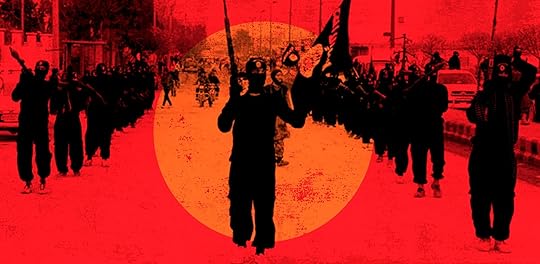
Over the weekend, the Islamic State claimed responsibility for the attack, and President Francois Hollande vowed a “merciless” response. Overnight, French warplanes struck targets in Raqqa, the Syrian city that serves as the Islamic State’s de facto capital.
French officials identified a further two attackers on Monday: Samy Amimour, a 28-year-old Frenchman charged in a terrorism investigation in 2012, blew himself up in the Bataclan music hall, the prosecutor’s office said. A suicide bomber who blew himself up near Stade de France, the national stadium, was identified by prosecutors as Ahmad Al Mohammad, 25. His fingerprints match those of someone who entered Europe through Greece last month, they said. Other attackers who have been identified are: Salah Abdeslam, a 26-year-old from Belgium who is still at large; his brother Ibrahim, who detonated his suicide belt on the Boulevard Voltaire; and Ismael Omar Mostefai, a 29-year-old Frenchman who was involved in the Bataclan attack. News media have identified an additional suspect as Bilal Hadfi, another of the stadium attackers.
The attacks are the worst violence on French soil since World War II, and the worst in Europe since 2004 when coordinated blasts on Madrid’s commuter train system killed 191 people. They also came 10 months after two Islamist gunmen killed 11 people at the offices of the Paris-based Charlie Hebdo, the French satirical magazine. Attacks around Paris that followed that massacre killed an additional five people.
France was already on high alert following those attacks when the events of Friday night unfolded. There were attacks on two restaurants in the 10th arrondissement (at least 12 dead in gun attacks) and two on restaurants in the 11th arrondissement (at least 24 dead). The national stadium, where France was playing Germany in a soccer match, was also attacked (at least three attackers dead), as was the Bataclan concert venue, which was packed with fans of Eagles of Death Metal, a rock band from California (at least 80 dead).
French official say that in all 129 people were killed and more than 350 injured in the attacks. Investigators believe the attackers operated in three teams throughout the city.
On Saturday, Hollande called the attacks “an act of war … prepared and planned from the outside, with accomplices inside.” He declared three days of mourning for the victims of the attack.
On Monday, France stood still for a minute of silence for the victims of the attacks. Hundreds gathered at the Place de la Republique in Paris to honor the victims. The Guardian reports: “One man held up French flags, several people wept and buses at the busy intersection pulled over. At the end, the crowd burst into spontaneous applause.”
Après la minute de silence, la place de la République applaudit pic.twitter.com/35XloyNC8L
— David Perrotin (@davidperrotin) November 16, 2015
France also announced a series of security measures, including the declaration of a state of emergency and the indefinite closing of the Eiffel Tower and other tourist attractions.
French police carried out more than 150 raids in Bobigny, Lyon, and Toulouse, Prime Minister Manuel Valls said. Dozens were detained. Raids also continued in Belgium, which as my colleague Matt Ford reported “has been tied to several perpetrators of recent high-profile jihadist attacks in Belgium and France.”
Leaders of the world’s 20 biggest economies continued their meeting in Turkey, but much of the conversation was focused on attacks in Paris, the Islamic State, the Syrian civil war, and the migration crisis—issues that are now inextricably linked.
At a news conference Monday at the end of the G20 meeting, Obama called the Islamic State “the face of evil. Our goal is to destroy this barbaric organization.”
Obama ruled out the use of ground troops in the conflict, but acknowledged the Paris attacks were a setback in the fight against the Islamic State. Still, he appeared to grow irritated at questions over whether his strategy was underestimating the militant group.
“The strategy that we are putting forward is the strategy that is ultimately is going to work,” he said. “It’s going to take time.”
President Obama met Sunday with Russian President Vladimir Putin for 35 minutes on the sidelines of the G20 to discuss the Syrian crisis, but Yuri Ushakov, the Kremlin’s top foreign-policy adviser, said while the two leaders shared the “strategic goals regarding the fight against Islamic State … they still differ as far as tactics are concerned.”
But speaking Monday, Hollande said he’d meet with Obama and Putin in the next few days to join forces against the Islamic State.
We will be updating this story as we learn more.









Shake Shack and the Rising Wages-Rising Prices Infinity Loop
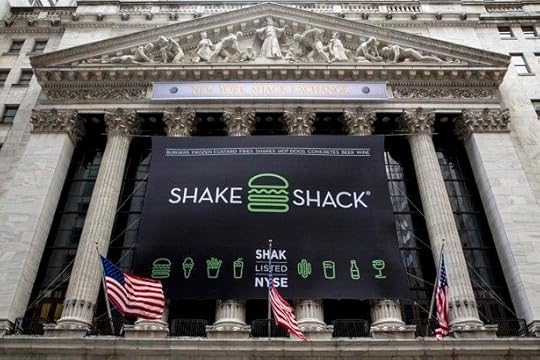
Earlier this week, it was reported that Shake Shack, the fast-casual wing of the Danny Meyer empire, would raise prices at its stores for the third time in less than 18 months. The reason, according to the company, is to accommodate rising worker pay around the country.
“Minimum wages continue to increase and we continue to compensate our teams above those minimums,” the company’s CFO Jeff Uttz said during an earnings call last week. “We intend to continue to offer competitive compensation packages and career development opportunities in order to attract the best talent and to take care of our team for the long-term.”
This progressive-sounding logic explains at least part of why sales at Shake Shack, made out to be one of the Arcadian alternatives to the typical fast-food hamburger chain, continue to boom while more established companies struggle. Being “better” is part of the fast-casual manifesto. A customer pays a few dollars more and waits a little bit longer for food that is usually neither organic nor healthy, but of higher quality than, say, a Wendy’s burger. The food is also prepared and served by employees who make slightly more than minimum wage.
“Shake Shack already pays its Washington, D.C., workers $12 an hour (the city’s minimum wage is $10.50 and will rise to $11.50 in 2016) and its workers in Texas $11 an hour (the state minimum wage is $7.25),” Venessa Wong at BuzzFeed reported.
Nevertheless, tying rising menu prices to increased worker pay seemed to strike a nerve. Amid the laudatory reactions, there was also dissent, which largely enfolded itself within opposition to the efforts to raise the minimum wage and the idea that higher wages will drive the price of everything else up. “Shackflation in Janet Yellen’s America,” one New York Times economic writer quipped.
Earlier this week, thousands of fast-food workers protested in hundreds of cities as part of the ongoing Fight for $15 campaign, a union-led effort to raise the hourly minimum wage to $15.
That’s a threshold that even Shake Shack isn’t close to crossing yet. However, if wages continue to go up and if the novelty of new and growing upscale enterprises like Shake Shack diminishes, rising price points could buck against recent successes and press some consumers to reconsider.
“It forces people to confront what they want,” Dr. Daniel Hamermesh, a professor at the University of Texas who specializes in labor economics. “If you want to have low-wage people paid more, you have to expect that the prices of those products they’re producing are gonna go up. It’s not going to come out of thin air.”
It almost goes without saying that fast food remains so affordable in part because of low labor costs. A recent study by Purdue University suggests that raising the hourly minimum wage to $15 would lead to a 4.3 percent price increase for such restaurants. Would fast-casual restaurants, whose growth has been largely fueled by the willingness of Millennials to pay just a little bit more for everything, alienate their nascent customer base? Hamermesh concedes that some consumers “will be priced out.”
“They’ll have to eat dinners at home or go back to more cheaper fast food,” he added. “No question about that. My guess is that those are people who are right in the middle of the income distribution.”
Contrary to common perception, the biggest consumers of fast food are middle-class Americans. There seems something tragic then about the possibility the fast-casual trend, which markets itself as a more principled alternative to traditional fast food, could become something increasingly out of reach for average consumers. With less than 50 U.S. outlets, Shake Shack may not be the bellwether.
“I can’t imagine that Shake Shack is the tail wagging the entire economic dog,” Hamermesh put it. “It’s not the way the world works.”
Hamermesh also pushes back against the idea that raising the hourly minimum wage for workers at a place like Shack Shake would fundamentally alter the national wage structure. His hypothetical example: Highly skilled workers who make software would not be affected by a minimum wage increase.
But if minimum wage increases continue to take hold, it may drastically alter the way that quick-service restaurants do business. Some argue that minimum-wage increases will eventually force companies to lay off employees and rely more on technology.
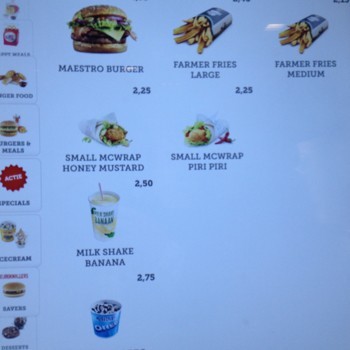 Adam Chandler
Adam Chandler A few weeks ago, I visited a McDonald’s in Amsterdam featuring touch screens that allow a customer to unhurriedly customize their order—a hallmark of the Chipotle or Five Guys experience—and obviated the need for as many cashiers taking orders in the front.
Earlier this year, when McDonald’s raised wages for all employees in company-run stores, Richard Adams, a consultant and former McDonald’s franchisee, predicted that fewer McDonald’s restaurants will keep late-night hours if wages go up. He also suggested that the fast-food restaurants might abolish their value menus.
“The key to McDonald’s success over the past 15 years has been the dollar menu,” Adams told me. “With higher labor cost that thing will have to go away.”
All of this is what Hamermesh calls “the crucial point” when it comes to raising wages.
“You're not going to get this for free,” he explained. “That somehow we can raise people’s wages to $15 and it’s not going to be passed at least partly through in higher prices. It will be passed at least partly through in higher prices.”









November 15, 2015
Who Were the Paris Attackers?
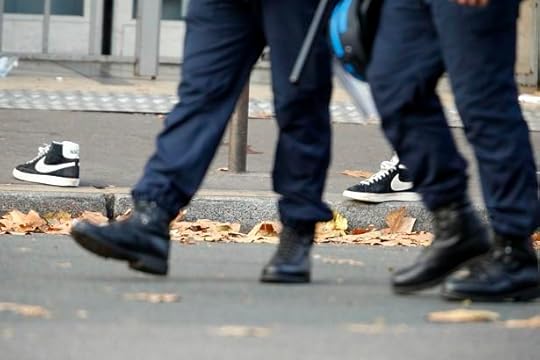
Updated at 5:38 p.m.
French authorities launched a manhunt for a possible eighth participant in the terrorist attacks that struck Paris on Friday, killing 129 people and wounding more than 350 others. Investigators also began releasing details about some of the seven known attackers as police and intelligence agencies try to piece together the details behind one of the deadliest attacks in Western Europe since the end of World War II.
France’s Police Nationale issued a nationwide alert Sunday for Abdeslam Salam, a 26-year-old man from Brussels, who they said was “likely to be involved” in the Paris attacks.
[AppelàTémoin] La #PJ recherche 1 individu susceptible d'être impliqué ds les attentats du 13/11/2015 #ParisAttacks pic.twitter.com/Gpr4MY1I53
— Police Nationale (@PNationale) November 15, 2015
In the chaotic initial hours of the attacks, early reports from police officials suggested the involvement of eight perpetrators, seven of whom had detonated suicide belts. Paris prosecutor Francois Molins subsequently announced during a Saturday press conference that seven suicide bombers working in three teams had been killed.
Salam is one of three brothers who have become the focus of the investigation, Le Monde reported Sunday. According to the French newspaper, one of Salam’s brothers detonated his suicide belt on the Boulevard Voltaire during the attacks. Two of the brothers also reportedly rented two vehicles in Belgium that have been recovered in Paris. One of them, a Volkswagen Polo, was found near the Bataclan, where four of the attackers killed several dozen concertgoers. A third brother was reportedly among the seven people arrested by Belgian officials in Molenbeek on Saturday in connection with the attacks.
Molenbeek, the impoverished Brussels suburb, has been tied to several perpetrators of recent high-profile jihadist attacks in Belgium and France. Medhi Nemmouche, who killed four people at the Jewish Museum of Brussels in March 2014, rented a room in the neighborhood shortly before his attack. Ayoub El-Khazzani, whose attempted attack on a Thalys train near the French town of Oignies in August was thwarted by passengers, also reportedly stayed there for a time.
Le Monde noted that Belgium contributed the highest proportion of ISIS fighters compared to its population of any Western European country. Amedy Coulibaly and the Kouachi brothers, who killed 17 people at the Charlie Hebdo offices and a Jewish supermarket in January, reportedly purchased most of their weapons from the Belgian underworld before the attack.
Ismael Omar Mostefai, the only named assailant in the Paris attack so far, was a 29-year-old French national by birth who lived in Chartres. Mostefai was one of the four attackers who stormed the Bataclan concert hall and died when he detonated his suicide belt. French authorities identified him from a single finger found at the scene.
According to Sky News, Mostefai was “known to security services,” but had not been incarcerated or linked to known extremist groups before the attacks. Le Monde reported he had spent part of 2013 and 2014 in Syria before returning to France. On Saturday, French police arrested seven of Moustefai’s family members and associates in Chartres, including his brother, who apparently surrendered himself at a police station in Creteil.
Details about the other attackers remain murky. The Paris prosecutor’s office said Sunday it had identified four of the seven suicide bombers so far, but did not release their names. (Mostefai was named by the mayor of Chartres.) The AP reported that three of the seven suicide bombers were French nationals.
We will be updating this story as we learn more.









What Is France Doing in Syria?
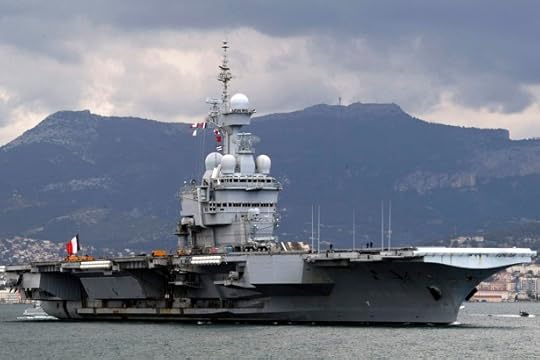
After Friday’s attacks in Paris, two sides that don’t usually agree on anything found common ground on one issue: Both Syrian President Bashar al-Assad and ISIS said the attacks were retaliation for France’s own foreign policy.
In a statement translated by SITE, ISIS said:
Let France and those who walk in its path know that they will remain on the top of the list of targets of the Islamic State, and that the smell of death will never leave their noses as long as they lead the convoy of the Crusader campaign, and dare to curse our Prophet, Allah’s peace and blessings be upon him, and are proud of fighting Islam in France and striking the Muslims in the land of the Caliphate with their planes, which did not help them at all in the streets of Paris and its rotten alleys.
Assad, meanwhile, criticized France for backing rebels against his regime; the attacks, he argued, showed that he and France were in the same predicament. “Wrong polices adopted by Western states, particularly France, towards events in the region, and its ignorance of the support of a number of its allies to terrorists, are reasons behind the expansion of terrorism,” he said.
Related Story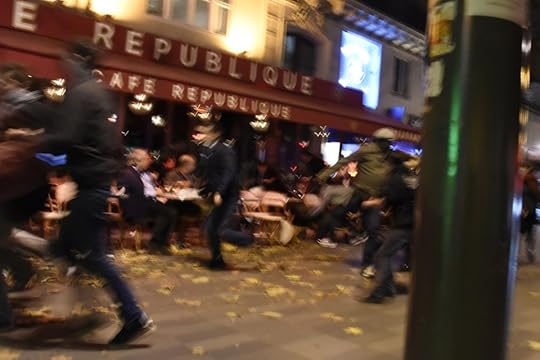
A Change of Strategy for ISIS?
But what exactly is France doing in Syria and elsewhere in the region? As The Guardian notes, France has been one of the most outspoken opponents of the Assad government throughout the civil war that has engulfed the country. Assad is battling scores of groups that seek to topple his regime, including ISIS, other Islamist groups, and militias backed by Western powers. France’s military efforts against ISIS have developed gradually over the course of the last 15 months—spreading from limited sorties in Iraq to include missions over Syria and the deployment of an aircraft carrier to the Persian Gulf.
On Sunday, according to Le Figaro, French planes “massively” bombarded the ISIS stronghold of Raqqa in Syria. The Wall Street Journal reports that the United States and France have increased their cooperation on intelligence in Syria since Friday’s attacks:
The U.S. is expanding intelligence sharing with France and has agreed to speed the delivery of detailed targeting information in support of possible French retaliatory strikes against Islamic State militants in Syria and Iraq, officials said.
France began airstrikes against the Islamic State in Iraq in September of 2014; as the Financial Times noted, it marked the first time France had launched a direct military intervention in the Middle East since helping to patrol a no-fly zone over Iraq prior to the American invasion in 2003, which France pointedly refused to join. The first French strike, which came within 24 hours of President Francois Hollande saying his country would join the air campaign, demolished a weapons depot and reportedly killed dozens of militants. French planes also began flying reconnaissance missions and delivering humanitarian aid. In authorizing these strikes, Hollande insisted that France’s involvement would be strictly limited. “We will only intervene in Iraq,” he said.
Since then, France has reportedly launched some 200 strikes in Iraq. The French task force is centered around the aircraft carrier Charles de Gaulle, which is currently stationed in the Persian Gulf. According to AFP, French air capacity in the region includes 21 Rafale fighters, nine Super Etendard fighters, and some Mirage jets. (By way of comparison, the U.S. says it has launched nearly 6,400 airstrikes in Syria and Iraq.)
Meanwhile, the French have seen some mission-creep. A year to the month after commencing airstrikes in Iraq, France began flying missions in Syria as well. “In Syria, so long as we haven’t found a political solution; so long as we haven’t destroyed this terrorist group, Islamic State; so long as we haven’t got rid of Bashar Assad; we will not find a solution,” Prime Minister Manuel Valls told Christiane Amanpour in September. In October, French strikes hit an ISIS camp in Raqqa, rumored to be housing foreign fighters including French nationals. Last week, French officials said planes had struck an ISIS-controlled oil refinery in Syria.
It’s worth noting that the ISIS statement translated by SITE makes no explicit mention of Syria. The French military has been heavily involved in operations against Islamist militant groups outside of the Middle East over the last few years, including one group that has pledged fealty to Abu Bakr al-Baghdadi, the Islamic State’s self-proclaimed caliph. France has deployed 3,000 troops to West Africa—a region where they’ve historically had great influence, as a colonial power and otherwise—with a presence in Nigeria, Niger, Chad, Burkina Faso, Mali, and Ivory Coast. The fight in Mali has centered on al-Qaeda affiliated militants, but in Nigeria and surrounding countries, France has been the Western nation most invested in fighting against Boko Haram, the brutal Nigerian Islamist organization. Earlier this year, Boko Haram pledged allegiance to Baghdadi. For radicals inclined to view Western fighting against Muslim groups and nations around the world as part of a larger crusade, France’s military deployment in Africa may be lumped together with its involvement in the Levant.
Of course, the statements from ISIS and Assad shouldn’t necessarily be taken at face value; whatever drove the Paris attackers to commit their horrific acts is certainly more complex and varied than the French government’s conduct in the world. Within France’s own borders, a long and acrimonious debate has been playing out over the role of Islam in the republic, raising the question, as Shadi Hamid phrased it in The Atlantic, of how liberal democracies can come to terms with religious illiberalism. Meanwhile, the only attacker named in Friday’s violence so far is Ismael Omar Mostefai, who was born and raised in France.









Will NATO Respond to the Attacks on Paris?
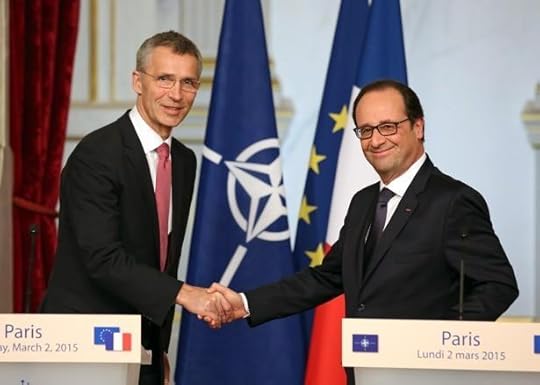
The killings of 129 people in multiple attacks on Paris on Friday have resulted in calls for a NATO campaign against the Islamic State, which claimed responsibility for the carnage.
“That’s a decision for the French to make,” Ben Rhodes, the White House’s deputy national security adviser, said on NBC’s Meet the Press. “What we’ve made clear to the French is we will be shoulder to shoulder with them in this response.”
At issue is Article 5 of NATO’s charter, which states that an attack on one member of the alliance is an attack on all of them. A response is based on the principle of collective defense. The article has been invoked just once in NATO’s more than six-decade history: after the attack of September 11, 2001.
In an interview with NPR, Admiral James Stavridis, a former NATO allied supreme commander, pointed out the attacks in Paris were similar to the attacks of September 11.
“I do [think that], and I think the French very much do. Any nation of the 28 in NATO has the authority to request an Article 4 consultation, which leads to an Article 5 declaration. I think France will do that. And I think they have pretty good - pretty good, valid grounds for that, particularly if you put the death level and the injury level on a population-adjusted basis - population of France about one-sixth that of the United States - this really starts to resemble a 9/11 level event. …
I think a NATO response would be four or five things. It would start with an enhanced level of intelligence-sharing and special operations from the NATO nations going in and supporting the current campaign. Secondly, NATO would take over the bombing campaign. This would bring many more assets - aircraft ordinance, the airborne early warning aircraft - into the fight. Thirdly, I think NATO should take on the training mission, both for the Kurds in the north and the Iraqi security forces in the south. [T]his way the United States doesn't have to pull the entire load. We need the alliance to step up and be there with us. And by the way, this ought to be not just NATO. There are many Arab states - and indeed Russia at least has articulated a desire to conduct operations as part of this - so I see this as NATO as the core of, effectively, a global response against the Islamic State.
Separately, Stavridis predicted to the BBC NATO will put “boots on the ground” against the Islamic State. He said he expected 10,000 to 15,000 of the alliance’s troops would be required.
Defense Secretary Ash Carter spoke with his French counterpart, Jean-Yves Le Drian, the Defense Department said in a statement, and discussed the campaign against the Islamic State.
“They agreed on concrete steps the U.S. and French militaries should take to further intensify our close cooperation in prosecuting a sustained campaign against ISIL,” Peter Cook, the Pentagon’s spokesman, said.
He did not elaborate on what those steps may be, but The Wall Street Journal reported the U.S. would expand intelligence sharing with France “and has agreed to speed the delivery of detailed targeting information in support of possible French retaliatory strikes against Islamic State militants in Syria and Iraq.”
Here’s more:
France has fighter aircraft positioned at bases in the region, in Jordan and the United Arab Emirates, which could be used in any retaliatory strikes against Islamic State in Syria and Iraq once targets have been identified.
French officials said France could step up its strikes in Syria and Iraq against Islamic State targets within days, including strikes based on the intelligence provided by the U.S.
Indeed, Le Figaro reported France began conducting airstrikes against Raqaa, the Syrian city that serves as self-declared capital of the Islamic State.
November 14, 2015
What's Next for Migrants After Paris?
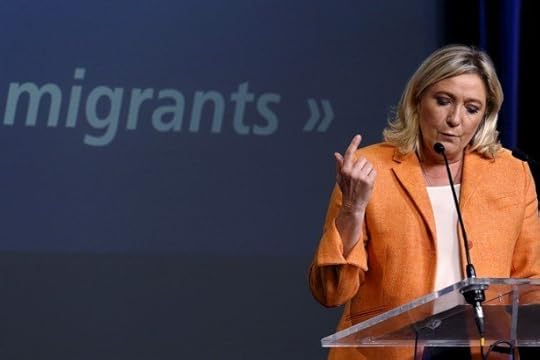
After a terrorist attack killed more than 120 people and injured hundreds more on Friday, France imposed border controls and authorities discovered a Syrian passport near the body of one of the attackers. While it’s not clear whether any of the assailants were migrants themselves—Syrian passports are often forged—the attack has nonetheless reignited the debate over Europe’s migrant crisis.
As Quartz notes, the attacks attributed to ISIS are anything but good news for migrants in Europe. Marine Le Pen, the leader of the far-right National Front party in France, told reporters on Saturday that “urgent action is needed” to “annihilate” Islamic fundamentalism. Le Pen went on to advocate that France regain control of its borders and expel “illegal migrants.”
In Poland, incoming Minister of European Affairs Konrad Szymanski announced today that the country will not accept migrants without security guarantees. In September, Poland agreed to accept 4,500 refugees as part of a European Union quota system.
In the U.S., the role the country should play in this refugee crisis is a subject of continued partisan debate. President Obama announced in September that at least 10,000 Syrian refugees will be resettled in the U.S. over the next year. While this number might seem small compared to the 4 million total refugees created by the war since 2011, it represents a marked jump from the fewer than 2,000 Syrian refugees accepted last year.
But some GOP candidates argued against the administration’s policy by suggesting that ISIS militants could infiltrate the country by hiding among refugees. According to Vox, Ben Carson, Ted Cruz, Mike Huckabee, and Rick Santorum quickly cited the Paris attacks to justify closing the borders to more Syrian refugees.
On the Democratic side, Hillary Clinton, Martin O’Malley, and Bernie Sanders have remained mostly quiet on the subject so far. All three have publically expressed their condolences for the victims and their families, but no one has yet made the leap to policy.
Heartbreaking news from Paris. Praying for the country and its people. -O'M
— Martin O'Malley (@MartinOMalley) November 13, 2015
The reports from Paris are harrowing. Praying for the city and families of the victims. -H
— Hillary Clinton (@HillaryClinton) November 13, 2015
Horrified by the attacks in Paris tonight. My thoughts are with the victims and their loved ones.
— Bernie Sanders (@BernieSanders) November 13, 2015
There will be time for that, however: the three candidates are set to face off in the second Democratic debate on Saturday night. After the attacks, host network CBS stated that the questions will now focus on terrorism, national security, and foreign affairs.
Meanwhile, to the north, Canada has its own ambitious refugee agenda to assess. Newly elected Canadian Prime Minister Justin Trudeau committed to resettling 25,000 Syrian refugees by the end of the year — a number deemed unrealistic by some observers. Regardless of the logistics, the Toronto Star reported earlier today that the country remains steadfast in its plan despite the Paris attacks.
Ultimately, how the recent events will affect the debate surrounding migration in Europe and beyond remains to be seen. What is clear is that there are 4 million people displaced by the crisis and, for them, a solution will need to be reached.









How the 2016 Candidates Responded to the Paris Attacks

As news bulletins from Paris reported a steadily mounting death toll on Friday night and into Saturday, the 2016 U.S. presidential candidates quickly offered their condolences for victims of the attack that claimed more than 120 lives and wounded upwards of 350 other people. After French authorities pinned the blame on ISIS, the tone of condolence shifted to one of criticism towards the Obama administration’s strategy in Syria and Iraq.
Most of the GOP presidential candidates, all of whom have repeatedly excoriated President Obama’s military strategy in debates and on the campaign trail, redoubled their criticisms in the attack’s aftermath.
President Obama said "ISIL continues to shrink" in an interview just hours before the horrible attack in Paris. He is just so bad! CHANGE.
— Donald J. Trump (@realDonaldTrump) November 14, 2015
Senator Marco Rubio, a Republican from Florida, released a short video in which he called the attacks a “wake-up call” to a “civilizational war against radical Islam.” Other GOP contenders echoed the clash-of-civilizations theme in their remarks and statements.
Former Florida Governor Jeb Bush emphasized the military nature of the conflict with ISIS. “It’s not a law-enforcement operation and the mindset in our country at least needs to change to recognize it for what it is,” he said in a radio interview with Hugh Hewitt. “This is an organized effort to destroy Western civilization and we need to lead in this regard.”
Many GOP candidates also reiterated their opposition to admitting Syrian refugees into the United States, alleging that members of ISIS could infiltrate the country despite security checks. “If we're going to be bringing 200,000 people over here from that region—if I were one of the leaders of the global jihadist movement and I didn't infiltrate that group of people with my people, that would be almost malpractice," current Republican frontrunner Ben Carson told reporters after addressing a conservative activists’ summit in Florida. The Obama administration announced a plan to accept 10,000 refugees from Syria into the U.S. in September, a far smaller figure than most European and Middle Eastern countries are sheltering.
We can't wait any longer. ISIS must be wiped out. #Paris pic.twitter.com/q26Bbn9gOA
— John Kasich (@JohnKasich) November 14, 2015
“We need to immediately declare a halt to any plans to bring refugees that may have been infiltrated by ISIS to the United States,” Senator Ted Cruz, a Republican from Texas, said in a statement on Friday. “We need to redouble our efforts to prevent ISIS agents from penetrating our nation by other means.” Addressing the military campaign in Iraq and Syria, Cruz also hinted at revising the U.S. military’s rules of engagement, saying that ISIS will “not be deterred by targeted airstrikes with zero tolerance for civilian casualties, when the terrorists have such utter disregard for innocent life.”
Former Arkansas governor and GOP presidential candidate Mike Huckabee urged the U.S. to “close its borders instead of Guantanamo,” saying on his website that “even the far left and politically correct government of France has closed its borders.” (French President Francois Hollande said he would close the borders during a televised address to the nation on Friday night, but instead imposed stricter border controls.) Huckabee also wrote that the U.S. should “revoke any agreement with Iran regarding their nuclear capacity” in the wake of the ISIS attack.
On the Democratic side of the 2016 race, the candidates focused on solidarity with France instead of foreign policy or military strategy towards ISIS. “Even in this darkest night, Paris remains the City of Light,” said former Secretary of State Hillary Clinton in a statement. “No terrorist attack will ever dim the spirit of the French people or our common commitment to the democratic values we share.”
Horrified by the attacks in Paris tonight. My thoughts are with the victims and their loved ones.
— Bernie Sanders (@BernieSanders) November 13, 2015
Clinton, Sanders, and former Maryland Governor Martin O’Malley will gather for the second Democratic presidential debate on Saturday night in Iowa, where the attacks are expected to be at the top of the agenda. As my colleague Russell Berman noted in his preview of the debate, CBS moderators said they would reorient the question topics towards national security and foreign policy in the wake of the Paris attacks.
Away from the 2016 race, one senior congressional Democrat took a more aggressive tone, perhaps signaling increased pressure from Capitol Hill for broader military action. “The fight is quickly spreading outside Iraq and Syria, and that’s why we must take the battle to them,” said Senator Dianne Feinstein, the top-ranking Democrat on the Senate Intelligence Committee. “It has become clear that limited air strikes and support for Iraqi forces and the Syrian opposition are not sufficient to protect our country and our allies.”









The Paris Attacks: What We Know
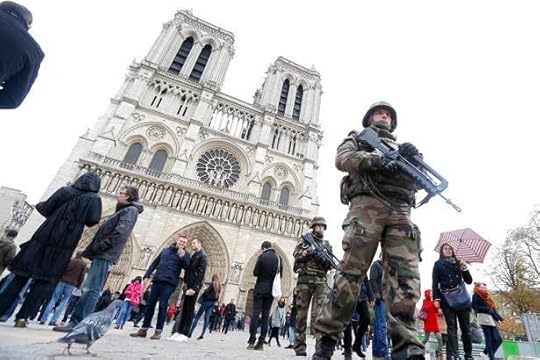
Updated on November 14 at 5:00 p.m. ET
What we know so far:
—Paris prosecutor Francois Molins confirmed 129 people had been killed and another 352 were injured, with 99 in critical condition. French officials said seven attackers operated in three teams throughout the city.
—A Greek official is saying that a holder of a Syrian passport that was found at the scene of one of the attacks passed through the Greek island of Leros on October 3.
—Belgian police have arrested multiple people during a raid in a Brussels neighborhood related to the attacks, the country’s justice minister said.
—The Islamic State has claimed responsibility for multiple attacks in Paris.
Related Story
—President Francois Hollande called the attacks an “act of war” and said France’s response would be “merciless.” He declared a nationwide state of emergency late Friday.
—There were at least six attacks: the Bataclan concert hall; Stade de France (the national stadium), La Carillon bar in the 10th arrondissement, La Petit Cambodge in the 10th arrondissement, La Belle Equipe in the 11th arrondissement, and La Casa Nostra in the 11th arrondissement.
The Islamic State appears to be claiming responsibility for multiple attacks in Paris on Friday night that killed at least 129 people and wounded 359 others.
Here’s part of the statement from the group, translation for which was provided by SITE, which tracks militant organizations:
Let France and those who walk in its path know that they will remain on the top of the list of targets of the Islamic State, and that the smell of death will never leave their noses as long as they lead the convoy of the Crusader campaign, and dare to curse our Prophet, Allah’s peace and blessings be upon him, and are proud of fighting Islam in France and striking the Muslims in the land of the Caliphate with their planes, which did not help them at all in the streets of Paris and its rotten alleys. This attack is the first of the storm and a warning to those who wish to learn.
Speaking on national television earlier Saturday, President Francois Hollande called Friday’s attacks an “an act of war … prepared and planned from the outside, with accomplices inside.”
He said France’s response will be “merciless against the terrorists.” Hollande declared three days of mourning for the victims, as France announced a series of security measure in the wake of the attacks, including the indefinite closing of the Eiffel Tower.
On Friday, as the attacks were unfolding and the scale of the carnage unclear, Hollande declared a nationwide state of emergency. The attacks are the worst violence on French soil since World War II, and the worst in Europe since 2004 when coordinated blasts on Madrid’s commuter train system killed 191 people. The attacks also came 10 months after two Islamist gunmen killed 11 people at the offices of the Paris-based Charlie Hebdo, the French satirical magazine. Several attacks around Paris that followed the Charlie Hebdo massacre killed an additional five people.
France was already on high alert following those attacks when the events of Friday night unfolded. There were attacks on two restaurants in the 10th arrondissement (at least 12 dead in gun attacks) and two on restaurants in the 11th arrondissement (at least 24 dead). The national stadium, where France was playing Germany in a soccer match, was also attacked (at least three attackers dead), as was the Bataclan concert venue, which was packed with fans of Eagles of Death Metal, a rock band from California (at least 80 dead).
Francois Molins, the Paris prosecutor, said in all 129 people were killed and 352 injured, 99 of them critically. He said investigators believed seven attackers operated in three teams throughout the city.
He said camera footage had led investigators to two cars: a black Fiat and a black Volkswagen Polo with a Belgian license plate.
“This [Polo] vehicle was rented by a French citizen in Belgium,” he said, according to France 24. “This person was seen on a different vehicle, was checked by police in actually a third vehicle—neither the Polo nor the Fiat—[with] two other persons living in the area of Brussels. They were checked at the border between France and Belgium.”
Belgian police arrested multiple people in connection with the attack in a raid on a Brussels neighborhood, Koen Geens, the country’s justice minister, said.
Separately, Nikos Toskas, the Greek deputy minister for citizen protection, said in a statement the holder of a passport that was found at the scene of one of the attacks passed through the Greek island of Leros on October 3. Greece is the main gateway into Europe for Syrians and others fleeing civil war and other unrest in their homelands. Europe is seeing the most-severe migrant and refugee crisis since World War II, and critics say their flow into Europe poses a security threat.
Victims
Nohemi Gonzalez, 23, a junior at California State University, Long Beach, was identified by the school as among the victims. She was in Paris attending Strate College of Design during a semester abroad program, the school said.
The London School of Economics tweeted that Valentin Ribet, who graduated from the school in 2014, died in the attack. Ribet worked in Paris for the law firm Hogan Lovells. Ribet died at the Bataclan.
The Guardian identified two other victims, both French, as Djamila Houd, 41, and Thomas Ayad, 34, another victim of the attack on the Batalcan.
Spanish media identified another victim as Alberto González Garrido, 29. He too was attending the concert at the Bataclan.
The British Foreign and Commonwealth Office said on Twitter that a Briton had been killed in the attacks. His family identified him as Nick Alexander. Alexander, they said, had been selling merchandise at the concert hall.
Reactions
Neighboring countries, including Italy and Belgium, said they were increasing security following the attacks, condemnation of which was near-universal.
The front pages from across France #Paris pic.twitter.com/MJxEpqO1Jz
— Philip Bromwell (@philipbromwell) November 14, 2015
Speaking in Vienna, where he is attending a meeting on the Syrian civil war, John Kerry, the U.S. secretary of state, called the attacks “vile, horrendous, outrageous.” British Prime Minister David Cameron vowed to do “whatever we can to help” France. “We are crying with you,” German Chancellor Angela Merkel said. “Together with you, we will fight against those who have carried out such an unfathomable act against you.” Pope Francis called the attacks part of a “piecemeal World War II,” and said “there is no religious or human justification for it.” On Friday night, even as the events were unfolding, President Obama called the situation “heartbreaking.”
Solidarity
Here’s a roundup of expressions of solidarity from social media with the people of France—from that country and elsewhere:
Best footage of a bad night: fans sing the French national anthem as they evacuate the Stade de France #ParisAttack pic.twitter.com/RBquueYTCL
— Tom Boadle (@TomBoadle) November 14, 2015
Sydney's Opera House, lit up in the colours of the French flag. @AFP @AFPphoto #ParisAttacks pic.twitter.com/qlvgeNFMZb
— Anthony Wallace (@AntAFP) November 14, 2015
In the wake of the tragedy in Paris, The #EmpireStateBuilding went dark at 10:00 PM/ET on Friday, November 13, 2015, in sympathy for Paris.
— Empire State Bldg (@EmpireStateBldg) November 14, 2015
The Oriental pearl Tower #TodosSomosParis pic.twitter.com/d0S6rRAYIZ
— Qingchen (@leinhado) November 14, 2015
One World Trade Center in #NYC lights up in blue, white and red to show solidarity with the people of France. #1WTC pic.twitter.com/XQieJbueyi
— CNBC (@CNBC) November 14, 2015
Americans use #StrandedInUS to open homes to strangers stuck after #ParisAttacks. https://t.co/ZPCPv9RrzG pic.twitter.com/SS318XQLre
— NBC Nightly News (@NBCNightlyNews) November 14, 2015
We will be updating this story as we learn more.









Democrats Return to Hillary Clinton
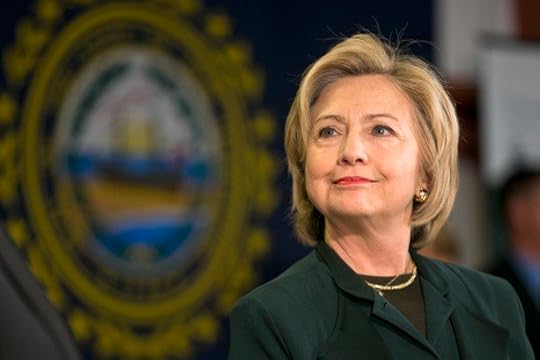
Heading into the second Democratic presidential debate, Hillary Clinton seems to be winning her party back.
Polls taken in the last two weeks show Clinton widening her lead over Bernie Sanders, as she’s used sterling performances in the first Democratic debate and a marathon session before Congress to blunt the momentum Sanders had seized over the summer. When the two meet Saturday night in Iowa, the pressure this time will be on Sanders: Can he sharpen his contrast with Clinton without veering into the kind of negative attacks that he repeatedly promised to avoid?
Clinton has benefitted from a number of developments in the last month—and not all of them her own doing. Vice President Joe Biden’s decision not to seek the nomination deprived establishment-minded Democrats of another alternative to the former secretary of state. And the dubious choice of House Republicans on the Benghazi committee to have her testify for 11 hours—while harping on emails from Sidney Blumenthal—played to her advantage by allowing her campaign to portray her appearance as one of resilience and grace under fire rather than the long overdue reckoning for a dithering diplomat.
Still, Clinton deserves some of the credit. Her campaign was understandably mocked when it informed The New York Times that Clinton would suddenly become more spontaneous, warm, and funny. But the plan seems to have been executed well. Her appearances on late-night talk shows have been filled with smiles and not-too-cringe-worthy jokes, and despite getting lower ratings, Clinton’s cameo on Saturday Night Live won stronger reviews than did Donald Trump's recent hosting gig. When Clinton has stumbled, such as when she laughed in response to a man saying he wanted to “strangle” Carly Fiorina, it has been overshadowed by news from the increasingly bizarre race on the Republican side. On the whole, a more joyful Clinton has replaced the halting, defensive candidate of the spring and early summer.
Sanders, meanwhile, has been hemmed in by his own tactical decisions. His dismissal of Republican attacks on Clinton’s email use in the State Department won cheers from Democrats in both camps, but his subsequent avowal that the ongoing FBI investigation was legitimate sounded like a belated attempt to take it back. And Sanders has an even narrower line to walk as he tries to take a more aggressive posture toward Clinton. The media tends to make little distinction between “drawing a contrast” and “attacking,” so when Sanders made some implicit criticisms of Clinton’s record at the Jefferson-Jackson Dinner in Iowa, the Clinton camp immediately accused him of ditching his pledge against negative campaigning. It’s easy to imagine Clinton having ready a more-in-sorrow-than-in-anger reply for any sharp words that Sanders directs her way in Saturday’s debate.
“There are two very different governing visions between Clinton and Sanders that really have not been fully fleshed out for voters.”All of this might explain Clinton’s stronger position in the polls. A national survey by the Times and CBS News released on Thursday found that Clinton not only held support from a majority of Democratic voters—52 percent to 33 percent for Sanders—but she was seen as the candidate most likely to bring “real change” to Washington. That latter finding strikes at the core of Sanders’s message that a “revolution” is needed to root out corruption from the political system and reduce the gap between the rich and the poor. While Democrats found Sanders to be more genuine than Clinton, she inspired more confidence in regulating big banks and financial institutions—another key aspect of his platform.
Those results could also reflect the fact that Clinton has narrowed the gap in policy with Sanders by embracing calls for debt-free college, get-tough policies on Wall Street, and more aggressive action on immigration, gun control, and criminal-justice reform. Her platform has quieted criticism from some progressive activists who have pushed leading Democrats to adopt an “Elizabeth Warren-style” agenda. “Generally speaking, there’s not a big debate about which direction the Democratic Party should go,” said Adam Green, co-founder of the Progressive Change Campaign Committee. “All candidates are advocating for a more economic populist Democratic Party. The debate has been how big to go and how exactly to get there.”
Democratic voters may see Clinton’s platform as more realistic than the more expensive agenda Sanders is proposing, or simply that she is the more viable candidate to achieve it. In explaining Clinton’s growing lead, Green suggested that the onus was on Sanders to explain the reasoning behind his vision in a way that inspires Democrats to come out and vote. “There are two very different governing visions between Clinton and Sanders that really have not been fully fleshed out for voters,” Green said. “Given her background and frontrunner status, the tie basically goes to Clinton.”
The focus of Saturday’s debate, which will air on CBS at 9 p.m. ET, will understandably shift more toward foreign policy and national security in the wake of the coordinated attacks in Paris that killed more than 120 people. “There is no question that the emphasis changes dramatically,” Steve Capus, the executive editor of CBS News, told the Times late Friday. Both Clinton and Sanders released statements of solidarity with France. They will likely face questions of whether they would expand President Obama’s war against the Islamic State and whether the Paris attacks should give the U.S. pause about taking in refugees fleeing Syria.
The debate also offers another chance for Martin O’Malley, who continues to struggle to make himself a legitimate threat to either Clinton or Sanders. He’ll at least get more speaking time without competition from Jim Webb or Lincoln Chafee, who dropped out after shaky performances in the first debate. (That opportunity might be limited more by the fact that the debate was scheduled for a Saturday night, a source of frustration for many Democrats.)
For Sanders, the challenge of stopping Clinton’s surge is clear, and reports suggest the famously unpolished candidate is preparing more for this contest than than he did for the first one. Clinton’s strategy is more of a mystery. While she has consolidated her frontrunner status in the primary, the same polls show that more voters overall view her unfavorably. Will she take on Sanders as she did in October, or will she focus her attacks on the Republicans she hopes to face a year from now? The choice Clinton makes will show just how comfortable she with the solid footing she’s regained.









The World Looks to Paris
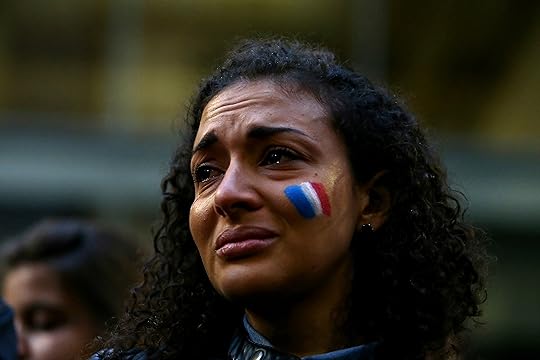
People around the world have responded to the Paris attacks with solidarity. State buildings were illuminated with the blue, white, and red of the French flag. Embassies around the world are now surrounded with bouquets, candles, and messages of good will in the memory of the people who were killed.









Atlantic Monthly Contributors's Blog
- Atlantic Monthly Contributors's profile
- 1 follower



